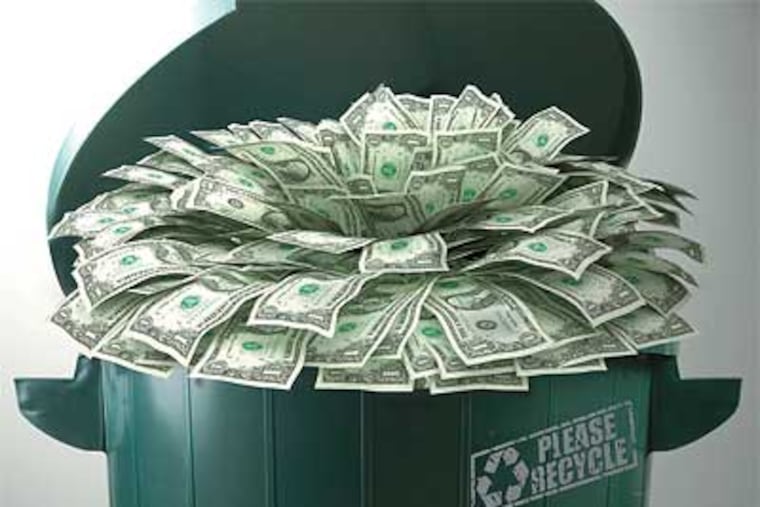City's trash: Pay as you throw?
IT'S CALLED "pay as you throw." The Nutter administration is researching whether to charge residents for trash collection, according to city officials.

IT'S CALLED "pay as you throw."
The Nutter administration is researching whether to charge residents for trash collection, according to city officials.
Environmental experts say this would encourage recycling because there is typically no charge for collecting recyclable waste.
And the fees would help pay for trash collection and disposal, which currently costs the city $95 million a year, according to Deputy Streets Commissioner Carlton Williams.
But will Philadelphians balk at shelling out for something they've been getting free for years as taxpayers?
"There'll be an uprising in the Northeast, I can tell you that," said Mary Jane Hazell, president of the Somerton Civic Association. "I love Mayor Nutter. I think he's a great guy. I just don't think [this will work]."
Budget Director Steve Agostini stressed that officials are only in the preliminary stages of looking into such a program, which is included in the city's five-year budget plan.
"We had a discussion about it early, which is why it's reflected [in the plan]," Agostini said. "We're trying to get some information nationally. We're trying to get to know what people are doing - would it make sense here?"
In Philly, just 8 percent of residential trash is recycled, compared with a national average of 18 percent.
The city is already trying to boost its low residential-recycling rate. Just this week, officials announced that single-stream recycling, in which plastic, metal, glass and paper don't have to be separated, is now available citywide. And they plan to have weekly recycling collection within a year. Many parts of the city are now on an every-other-week schedule.
"I think the number-one benefit of fees for trash removal is it makes people think twice before they toss something out," said Janet Larsen, the director of research for the Earth Policy Institute, a nonprofit environmental-research organization.
David Biddle, executive director of the Greater Philadelphia Commercial Recycling Coalition, said that paying for trash collection is common.
"People pay for their trash services all over the country," he said. "It's really only the large cities that struggle with the concept."
Seattle is home to the nation's oldest pay-per-trash program, since the 1980s charging residents based on their amount of trash.
Residents pay by the size of their trash can or cans. For example, they pay $17.65 per month for a 32-gallon can or $35.30 for a 62-gallon can. If you put out an additional bag, you're charged extra.
Most people use one 32 gallon can each week, said Tim Croll, solid-waste director of Seattle's Public Utilities.
The single-family recycling rate in Seattle is 64 percent. But, unlike Philadelphia, Seattle recycles food and yard waste.
In addition to boosting recycling, the fee system could be a financial benefit to the city.
In Seattle, waste removal is a separate utility. The fees generated from trash collection go to a "solid-waste fund" that pays for trash removal and disposal, Croll said. The trash fees cannot be used for any general-fund purposes.
But in Philadelphia, garbage and recycling fall under the Streets Department.
Williams, the department's commissioner, said that Philadelphia would likely save money if it recycled more waste. He said that the city currently pays $62 to dispose of a ton of rubbish - typically to a landfill or an incinerator.
Meanwhile, the city earns $38 for every ton that is recycled.
Croll said that there was some protest when the pay-per-weight program started in Seattle, but there had already been a garbage fee in place, which made the transition less difficult.
"We're building on an environmental ethic that's in the region anyway," he said.
Biddle said that the key for Philadelphia will be selling the concept to residents.
"There are a lot of cynics in the city who believe it's impossible," Biddle said. But he added that "one of the reasons Michael Nutter was elected so resoundingly was that the city was ready for change."
Councilman Frank DiCicco, who chairs the streets committee, said he'd like to see if the switch to single-stream recycling improves performance before taking more drastic measures.
"I'd like to see single stream, once a week, I'd like to see what that gets us in terms of participation," he said.
And in regard to "pay as you throw," he said: "I think it would be a very hard sell." *